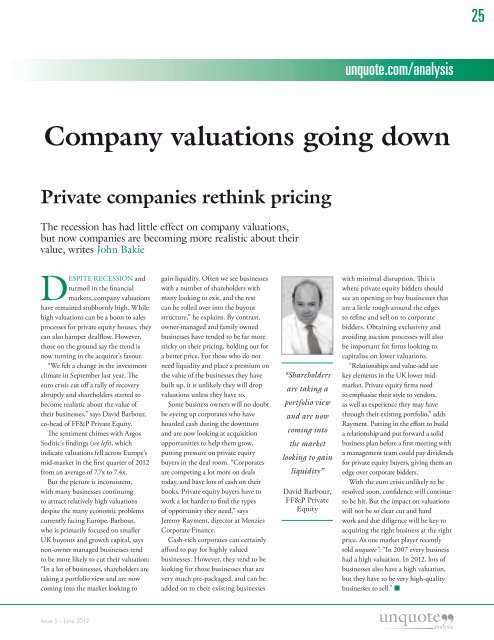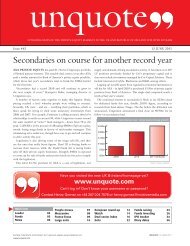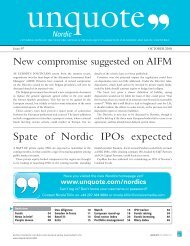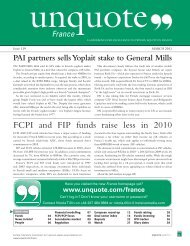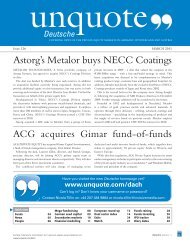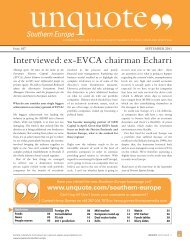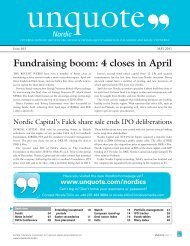Firstly, Lion Capital acquired eyewear retailer Alain Afflelou - Unquote
Firstly, Lion Capital acquired eyewear retailer Alain Afflelou - Unquote
Firstly, Lion Capital acquired eyewear retailer Alain Afflelou - Unquote
You also want an ePaper? Increase the reach of your titles
YUMPU automatically turns print PDFs into web optimized ePapers that Google loves.
25<br />
unquote.com/analysis<br />
Company valuations going down<br />
Private companies rethink pricing<br />
The recession has had little effect on company valuations,<br />
but now companies are becoming more realistic about their<br />
value, writes John Bakie<br />
Despite recession and<br />
turmoil in the financial<br />
markets, company valuations<br />
have remained stubbornly high. While<br />
high valuations can be a boon to sales<br />
processes for private equity houses, they<br />
can also hamper dealflow. However,<br />
those on the ground say the trend is<br />
now turning in the acquirer’s favour.<br />
“We felt a change in the investment<br />
climate in September last year. The<br />
euro crisis cut off a rally of recovery<br />
abruptly and shareholders started to<br />
become realistic about the value of<br />
their businesses,” says David Barbour,<br />
co-head of FF&P Private Equity.<br />
The sentiment chimes with Argos<br />
Soditic’s findings (see left), which<br />
indicate valuations fell across Europe’s<br />
mid-market in the first quarter of 2012<br />
from an average of 7.7x to 7.4x.<br />
But the picture is inconsistent,<br />
with many businesses continuing<br />
to attract relatively high valuations<br />
despite the many economic problems<br />
currently facing Europe. Barbour,<br />
who is primarily focused on smaller<br />
UK buyouts and growth capital, says<br />
non-owner managed businesses tend<br />
to be more likely to cut their valuation:<br />
“In a lot of businesses, shareholders are<br />
taking a portfolio view and are now<br />
coming into the market looking to<br />
gain liquidity. Often we see businesses<br />
with a number of shareholders with<br />
many looking to exit, and the rest<br />
can be rolled over into the buyout<br />
structure,” he explains. By contrast,<br />
owner-managed and family owned<br />
businesses have tended to be far more<br />
sticky on their pricing, holding out for<br />
a better price. For those who do not<br />
need liquidity and place a premium on<br />
the value of the businesses they have<br />
built up, it is unlikely they will drop<br />
valuations unless they have to.<br />
Some business owners will no doubt<br />
be eyeing up corporates who have<br />
hoarded cash during the downturn<br />
and are now looking at acquisition<br />
opportunities to help them grow,<br />
putting pressure on private equity<br />
buyers in the deal room. “Corporates<br />
are competing a lot more on deals<br />
today, and have lots of cash on their<br />
books. Private equity buyers have to<br />
work a lot harder to find the types<br />
of opportunity they need,” says<br />
Jeremy Rayment, director at Menzies<br />
Corporate Finance.<br />
Cash-rich corporates can certainly<br />
afford to pay for highly valued<br />
businesses. However, they tend to be<br />
looking for those businesses that are<br />
very much pre-packaged, and can be<br />
added on to their existing businesses<br />
“Shareholders<br />
are taking a<br />
portfolio view<br />
and are now<br />
coming into<br />
the market<br />
looking to gain<br />
liquidity”<br />
David Barbour,<br />
FF&P Private<br />
Equity<br />
with minimal disruption. This is<br />
where private equity bidders should<br />
see an opening to buy businesses that<br />
are a little rough around the edges<br />
to refine and sell on to corporate<br />
bidders. Obtaining exclusivity and<br />
avoiding auction processes will also<br />
be important for firms looking to<br />
capitalise on lower valuations.<br />
“Relationships and value-add are<br />
key elements in the UK lower midmarket.<br />
Private equity firms need<br />
to emphasise their style to vendors,<br />
as well as experience they may have<br />
through their existing portfolio,” adds<br />
Rayment. Putting in the effort to build<br />
a relationship and put forward a solid<br />
business plan before a first meeting with<br />
a management team could pay dividends<br />
for private equity buyers, giving them an<br />
edge over corporate bidders.<br />
With the euro crisis unlikely to be<br />
resolved soon, confidence will continue<br />
to be hit. But the impact on valuations<br />
will not be so clear cut and hard<br />
work and due diligence will be key to<br />
acquiring the right business at the right<br />
price. As one market player recently<br />
told unquote”: “In 2007 every business<br />
had a high valuation. In 2012, lots of<br />
businesses also have a high valuation,<br />
but they have to be very high-quality<br />
businesses to sell.” n<br />
Issue 5 – June 2012


